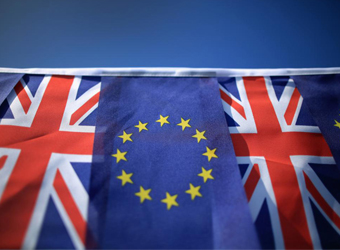Prime Minister Theresa May will only detail how big a divorce settlement Britain is willing to pay the EU when the bloc gives a commitment to moving talks forward, according to a plan rubber-stamped by even her most pro-Brexit ministers.
The Brexit bill has become one of several hurdles to talks to unravel more than 40 years of union, with London reticent to offer too much too soon on what officials consider to be one of its strongest bargaining chips.
In Brussels, British media speculation that May has won the backing of Brexit hardliners to offer more cash prompted talk among EU diplomats that a deal to unblock talks on future trade relations could be in the making ahead of a crunch Brussels summit in three weeks.
At a meeting on Monday, May’s Brexit committee – made up of some of her top ministers – backed the long-held strategy that Britain would honor commitments made when it was a member of the European Union.
But the government will only offer any specifics when the bloc’s negotiators give a commitment that talks will move to a discussion of the future relationship.
“We are ready to move onto phase two, to see those talks about a deep and special partnership with the EU for the future, a comprehensive trade agreement with the EU,” May said on Tuesday.
The Brexit bill has become one of several hurdles to talks to unravel more than 40 years of union, with London reticent to offer too much too soon on what officials consider to be one of its strongest bargaining chips.
In Brussels, British media speculation that May has won the backing of Brexit hardliners to offer more cash prompted talk among EU diplomats that a deal to unblock talks on future trade relations could be in the making ahead of a crunch Brussels summit in three weeks.
At a meeting on Monday, May’s Brexit committee – made up of some of her top ministers – backed the long-held strategy that Britain would honor commitments made when it was a member of the European Union.
But the government will only offer any specifics when the bloc’s negotiators give a commitment that talks will move to a discussion of the future relationship.
“We are ready to move onto phase two, to see those talks about a deep and special partnership with the EU for the future, a comprehensive trade agreement with the EU,” May said on Tuesday.
“I think that’s in the interests of the UK and in the interests of the remaining EU-27. I think it’s also important that the UK and the EU step forward together,” she added, a turn of phrase a source said expressed her desire for coordination.
In public, Brussels is standing firm on the need for Britain to first make clear not a concrete ‘euros and cents’ offer but a commitment to pay a share of EU spending for some items after Brexit – one of three key conditions the EU has set for opening trade talks.
Asked if the EU was ready to give a promise to start those talks as soon as London offers more money, European Commission deputy head Frans Timmermans told CNN: “I hear them saying that. But as far as the EU27 is concerned, … if we tackle the three issues … if we deal with that satisfactorily, we can move to the next stage. And that’s been crystal clear since Day One.”
MAKING IT EASIER
Nonetheless, EU negotiators are willing to help May with at least the appearance of cutting a deal. They could help “fudge” the amount of cash being handed over. And the EU already has an outline of a transition and free trade accord, which May could point to as something she had secured in exchange.
“We are ready to present the exit bill in a way that would make it easier for the Brits to sell at home,” one diplomat said. He added that EU officials had looked at whether Britain might forgo its roughly 50-percent rebate on EU budget payments during a two-year transition period after Brexit, so reducing the gross amount Britain would otherwise hand over in advance.
With only 16 months until Britain leaves the bloc, May is under increasing pressure not only from EU officials to move on the money, but also by businesses to provide certainty by early next year so they can make investment decisions.
But she has a tightrope to walk.
Many in her governing Conservative Party want Britain to quit the talks, feeling the EU is holding the country hostage over money, which they want to spend at home rather than abroad.
Her spokesman said no figures were discussed at Monday’s meeting and other ministers gave no details of what was discussed.
Local media reported that she could increase the sum to 40 billion pounds ($53 billion), more than double the initial estimated offer of 20 billion euros ($23.5 billion). The Commission has cited a figure of 60 billion euros but EU officials have long said that is up for negotiation.
For many in May’s own party, however, the suggestion of any increase in how much Britain will pay at a time when talks had failed to move forward for five months was unpalatable.
“I need to be able to look my voters in the eye and be able to say that I have backed a deal that is in the interests of Britain,” Conservative lawmaker Andrew Bridgen told Reuters.
“If I can’t do that, I will vote against a deal and we will go to WTO rules of trade, rules with which we already trade with most of the world successfully.”
source: Reuters


